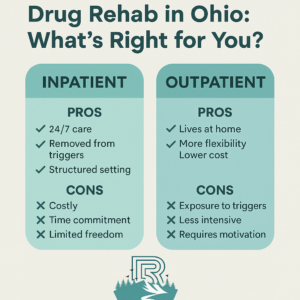When someone you love is using—and using hard—every day can feel like a tug-of-war between hope and heartbreak. You may be doing the research while they’re still not ready, or maybe they’ve agreed to get help but aren’t sure what kind. That’s where understanding the difference between inpatient and outpatient drug rehab treatment becomes not just helpful—but crucial.
Below, we’ve broken it down so you don’t have to guess. This isn’t just a pros and cons list. It’s a way to find clarity in the chaos, and maybe, a path that makes sense for both of you.
1. Inpatient Rehab Offers Full-Time Safety and Structure
Inpatient (or residential) treatment means your loved one lives at the facility. It’s 24/7 care—ideal for those in active use, detoxing, or facing complex emotional or physical challenges.
Pros:
- Constant supervision and medical support
- A clean break from everyday triggers and stressors
- Immersive therapy, daily routines, and peer connection
- Access to detox and psychiatric services onsite
Cons:
- Higher cost and longer time commitment
- Temporary separation from family, children, or partners
- May be emotionally difficult for both of you to navigate the distance
Inpatient care in Ohio typically ranges from 28 to 90 days. It’s intensive, but sometimes intensity is what saves a life.
2. Outpatient Rehab Provides Flexibility With Real-Life Application
Outpatient treatment allows someone to live at home while attending therapy and support sessions several times a week. It works well for people transitioning from inpatient or those with strong support systems and relatively stable routines.
Pros:
- Allows for continued work, school, or caregiving
- Less disruptive to family or parenting routines
- Generally more affordable than inpatient care
- Offers levels of intensity: PHP (partial hospitalization), IOP (intensive outpatient), and standard outpatient
Cons:
- Increased exposure to triggers and environments associated with use
- Less daily structure and supervision
- Requires high motivation and accountability
Outpatient can be incredibly effective—especially when it’s part of a larger continuum of care, with strong clinical support and family involvement.
3. How Do You Know What They Need?
This might be the hardest truth: no treatment works without willingness. But willingness doesn’t have to look like full confidence. It might just be a sigh and a quiet, “Okay, I’ll try.”
The decision often depends on:
- How often and how heavily they are using
- Whether they’ve tried treatment before
- Whether they can function daily (job, parenting, hygiene)
- Their mental health status (trauma, depression, psychosis)
You may not have all the answers—and that’s okay. An assessment with a licensed addiction counselor can help clarify what level of care is appropriate.

4. What Ohio Families Often Choose First
At River Rocks Recovery, many families start with outpatient options because they feel less overwhelming. That’s okay. Sometimes outpatient is the right fit, especially when a client is open, functioning, and supported. But when we see repeated relapses, risky behavior, or emotional volatility, inpatient is often the safer route.
Ohio offers a strong network of treatment facilities, including dual-diagnosis care, trauma support, and medication-assisted treatment (MAT). Our job is to help you find the setting that meets your loved one’s needs and your family’s capacity.
5. You Don’t Have to Decide Alone
Being in love with someone who’s actively using is a heavy load to carry. Choosing a treatment path can feel like one more impossible decision. But you’re not alone in this. At River Rocks Recovery, we help families and partners in Ohio make these decisions every day—with clarity, compassion, and respect for everyone involved.
You don’t need to have it all figured out. You just need to take the next step.
Ready to Talk It Through?
You don’t have to decide this alone. Call us at (888) 905-6281. River Rocks Recovery can help you figure out what kind of drug rehab treatment is right for your loved one—and how to take the next step with compassion, clarity, and care.
Frequently Asked Questions
What’s the main difference between inpatient and outpatient rehab?
Inpatient rehab involves living at the facility full-time, while outpatient rehab allows the person to live at home and attend scheduled treatment sessions. Inpatient provides more structure and supervision, while outpatient offers flexibility.
Is outpatient drug rehab effective?
Yes—especially when the person is motivated, has a stable home environment, and participates consistently. It’s also highly effective as a step-down after inpatient care.
What if my partner refuses to go to rehab?
You can’t force someone into lasting recovery. But you can set boundaries, seek support for yourself, and consult a professional. Sometimes just knowing what options exist helps open the door.
How much does drug rehab treatment cost in Ohio?
Costs vary based on level of care, length of stay, and insurance coverage. Outpatient tends to be less expensive than inpatient. Many facilities accept Medicaid, private insurance, or offer sliding scale options.
Can I be involved in my loved one’s treatment?
Absolutely. At River Rocks Recovery, we believe healing is relational. Family involvement is encouraged through education, therapy sessions, and ongoing support.
Learn more about our Ohio outpatient programs or call today at (888) 905-6281 to find out which path might be best for the person you love.




























